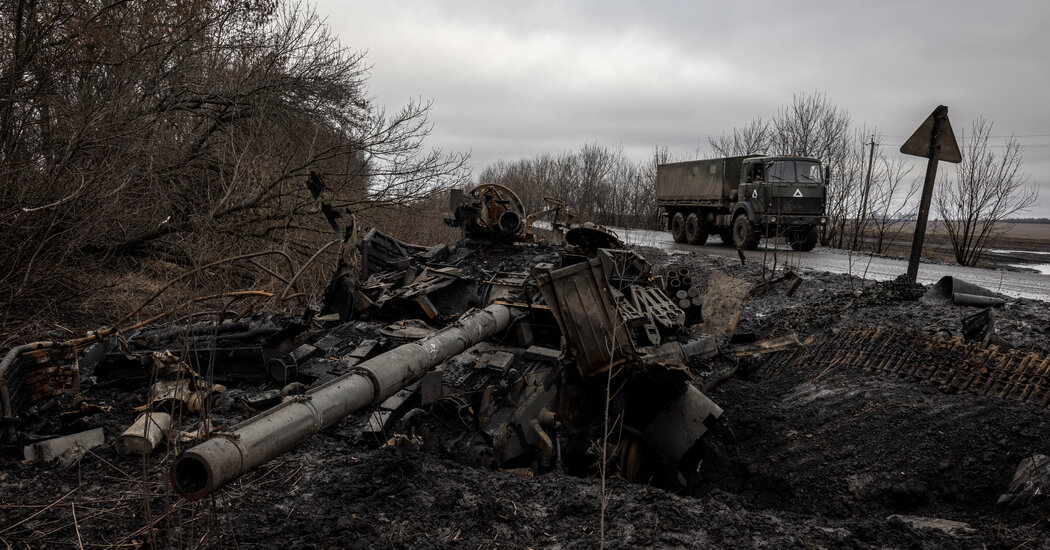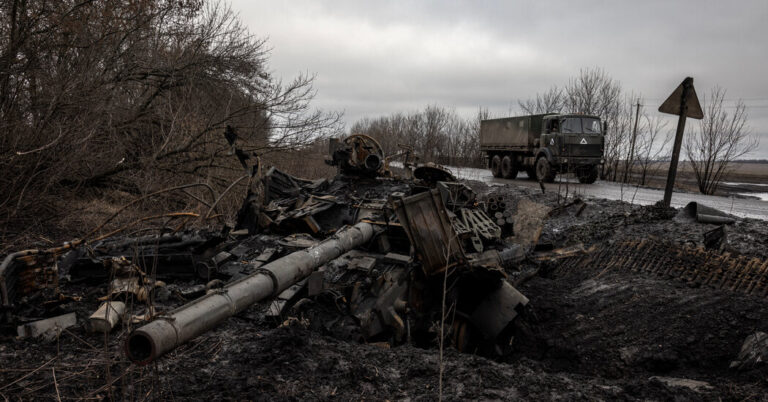After winning the election and taking office in the White House, many presidents end up breaking a campaign promise at some point. Donald J. Trump won’t even wait that long. He will break an important campaign promise when he takes the oath of office.
As he sought to return to power in the fall, Trump repeatedly made a sensational, if implausible, promise with profound geopolitical consequences: He would broker an end to the war in Ukraine in 24 hours. And not just in 24 hours: he would have done it before being sworn in as president.
“Before I even get to the Oval Office, right after I win the presidency, I will solve the horrible war between Russia and Ukraine,” Trump promised at a June rally. “I will resolve this issue before I even become president,” he said during his televised debate with Vice President Kamala Harris in September. “I will resolve the Russia-Ukraine issue while I am president-elect,” he said again during a podcast in October.
It wasn’t an extemporaneous comment, an isolated comment that he hadn’t repeated. It was a staple of his public argument when dealing with the largest land war in Europe since the fall of Nazi Germany. Yet not only did he fail to keep his promise; he has also made no serious effort to resolve the war since his election in November, and the fighting will continue to rage even after noon on Monday, when President-elect Trump becomes President Trump again.
“Wars can’t be solved with fanfare,” Senator Richard Blumenthal, Democrat of Connecticut, said in an interview. “And the missing link in his thinking is the failure to understand that the Ukrainians will reach agreement only if they come to the negotiating table from a position of strength. He actually undermined their position, and that’s one of the reasons he didn’t reach a solution before he took office.”
Mr. Trump, of course, is no stranger to hyperbole. The brazen claim that he could stop the war easily, quickly and single-handedly with the proverbial snap of his fingers was in line with the long-standing “I alone can fix things” image that Trump likes to present to the public.
But time and time again over the course of nearly a decade in national politics, rhetoric has clashed with reality and grandiose promises have fallen by the wayside. And while other presidents have paid a price when they don’t keep a promise (ask George H. W. Bush to read his lips on taxes), Trump simply plows ahead with no discernible consequences.
It has not, for example, completely built its much-vaunted border wall, much less forced Mexico to pay the costs. It did not erase the federal budget deficit or reduce the national trade deficit. He did not create a permanent peace between Israel and the Palestinians, which he said would not be “as difficult as people have thought over the years.” He did not repeal or replace Obamacare. It did not stimulate economic growth to “4, 5 or even 6%”.
During this transition to a second term, Trump helped impose a temporary suspension of fighting in Gaza, which took effect Sunday, sending an envoy to pressure Israel to accept the long-standing ceasefire that President Biden had initially put in place. on the table. . While the deal was hammered out by Biden’s team, Trump’s pressure played a critical role in it finally going into effect, a major success for the incoming president.
But Ukraine in many ways represents a much more daunting challenge for Trump because he will be starting from scratch. Unlike Gaza, there is no peace plan from his predecessor, with all the complex logistics, timeframes and formulas already worked out, that Trump can simply adopt and cross the finish line.
Just this month, Keith Kellogg, the new president’s designated special envoy for the war in Ukraine, postponed plans to travel to Kiev, the Ukrainian capital, and other European cities to begin exploring the situation until after the inauguration. He told Fox News that he hoped to resolve the problem within 100 days, which would be 100 times the time Trump originally promised, even if successful.
“It was an absurd promise,” said Kathryn Stoner, a senior research fellow at Stanford University’s Freeman Spogli Institute for International Studies. “The only person who can actually end the war in 24 hours is Vladimir Putin, but he could have done it years ago. Any negotiation will take more than 24 hours, regardless of when Trump starts the clock.”
Michael Kimmage, author of the book “Collisions,” on the Russia-Ukraine conflict, and new director of the Wilson Center’s Kennan Institute, said Trump’s campaign promises had always been kept “very loosely” and were perhaps more about sending signals rather than be interpreted precisely.
“His goals with this language could be as follows: to warn the government that its approach to Russia and the war will be different from Biden’s, that its main goal is to end the war and not for Ukraine to win ” and “ that he will be in command and not the deep state that entrenches the United States in eternal wars”.
These signs have left it unclear how Trump envisions arriving at a deal, but given his long-standing affinity with Russian President Vladimir V. Putin, his hostility toward Ukraine and his resistance to U.S. military aid to Kiev, analysts expect that any agreement can be reached. try to be favorable to Moscow. Vice President-elect J.D. Vance has suggested letting Russia keep the 20% of Ukraine it illegally seized through aggression and forcing Ukraine to accept neutrality rather than alignment with the West, a framework that echoes Russian priorities.
Asked via email why Trump had not made good on his campaign promise to end the war before he took office, Karoline Leavitt, the new White House press secretary, did not respond directly, but instead repeated that she will make “one absolute priority.” in his second term.”
After his November election, Trump met with Ukrainian President Volodymyr Zelensky and spoke about meeting with Putin after his inauguration.
Rep. Michael Waltz, Republican of Florida, who will become Trump’s national security adviser, stressed Sunday that ending the Ukraine conflict remains a top priority for the new president, calling the war “literally a meat grinder of people” akin to Trench warfare of World War I “with escalating consequences of World War III.”
But the thought Waltz described during an appearance on “Face the Nation” on CBS sounded like the formula for a process that could take a while: “The key pieces of it: Number one, who do we bring to the table? Number two: How do we bring them to the table? And then three: what are the basis of an agreement?”
“President Trump is clear: This war must end,” Waltz added. “Everyone, I think, should agree with this.”
Even if everyone agreed to this goal – and there is room for doubt – the possible terms remain thorny. Even assuming that NATO membership is not in the cards, Ukraine wants serious security guarantees from the United States and Europe, especially if it is forced to give up its territory, which Russia would oppose.
Then there are questions of compensation and consequences. Who would pay to rebuild Ukraine’s devastated cities and countryside? What would happen to International Criminal Court arrest warrants against Putin and other Russian figures for alleged war crimes? Would the United States and Europe ease sanctions imposed after the full-scale invasion in 2022, and if so under what conditions? Who would guard a deconfliction line and what would happen if the ceasefire was violated?
Trump has not publicly addressed those issues in any depth, leaving many guessing. However, he expressed concern about the continuing casualties in Ukraine and the urgency of finding the answers, whatever they may be.
“Part of the point – and this may shed some light on his administration’s eventual course of action – may be to not have a script and therefore to speak in ways that obscure rather than reveal what the real script is.” , Kimmage. he said. “The less we know what he’s doing, the more he can improvise.”





